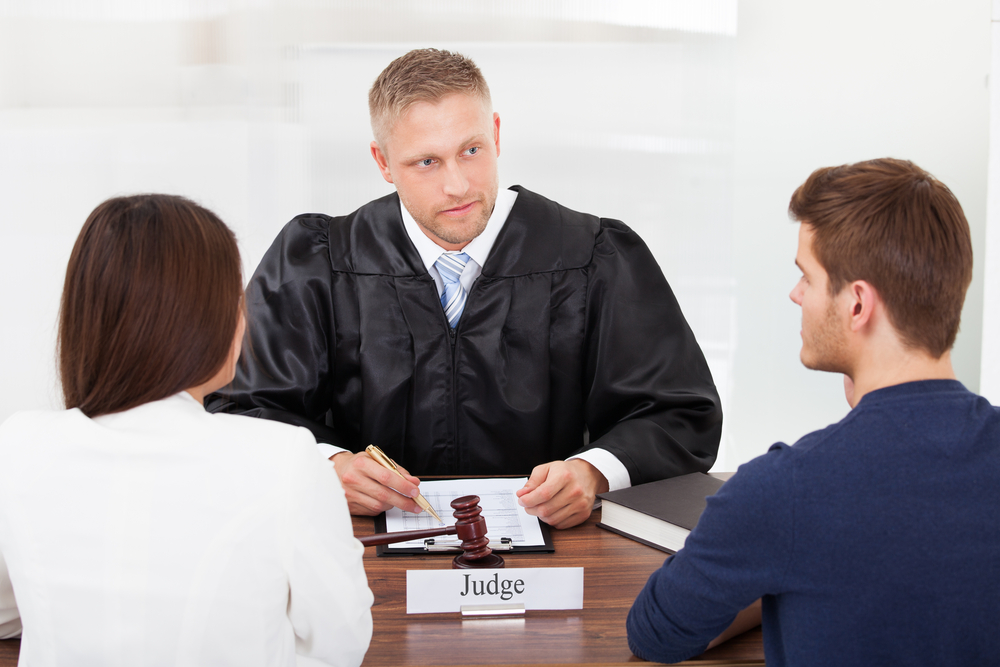How will bankruptcy of a husband affect his wife? We will examine in more detail in this matter. Compliance with bankruptcy laws of individuals not allows you to free yourself from credit slavery, as well as write off all existing debts. Nevertheless, practice shows that the bankruptcy of one citizen can affect other members of his family, for example, the bankruptcy of one of the spouses entails certain consequences for the other. Thus, spouses are deprived of property jointly acquired in the process of marriage. These, unfortunately, are the nuances of modern legislation in our country, which those people who plan to start filing a bankruptcy procedure for a husband will have to come to terms with if the wife works.

Features of the bankruptcy of one of the spouses
There is a general rule according to which one spouse is not liable to the creditors of the other and for the obligations of the debtor spouse the recovery may be levied exclusively on his own property. However, in some cases, property that is jointly owned by both spouses often suffers from such procedures. This is based on those provisions in the law that provide for the regime of joint property of husband and wife.
What does it mean?
Such property may include the income of each spouse from his labor activity, as well as from entrepreneurship, if any. In addition, the common property of the spouses is all kinds of benefits, pensions and other material payments. Common are all things and objects of movable nature and real estate, shares, deposits, as well as securities. The nuance also lies in the fact that one of the spouses who did not engage in labor activities during the marriage, that is, did household work, took care of children, or for other good reasons did not have an independent income, as well as the working spouse, is the joint owner acquired property.
The husband’s bankruptcy procedure, if the wife works, is a rather complicated process, even in cases when it concerns only one of their spouses. The main thing to rely on in this case is the concept of “common property”, with which all the basic elements and nuances of the legislation governing such processes are associated.
Insolvency of one of the spouses
It should be noted that the section of family law governing the processes of family bankruptcy does not have a sufficient number of precedents for there to be a unified method of dealing with such issues.
It would seem, what does the spouse of a bankrupt citizen have to do with his debt obligations? However, due to the fact that the main thing that affects this issue is the common property, we can conclude that the second spouse has the most direct relation to this. Everything that was acquired by joint labor activity, and acts as this very property. In other words, the property of the wife in the event of the bankruptcy of the husband will be seized to pay off debts.

Nevertheless, the Plenum of the Supreme Arbitration Court in Decree No. 18 established that it is impossible to infringe upon the legitimate rights of a bona fide spouse, and that property that belongs to the bankrupt spouse should be taken into realization first under debt obligations and written directly in his name upon his purchase.
What does a husband bankrupt if a wife works?
This system is considered the most humane, however, the Family Code of the Russian Federation states that when paying debts, funds are debited from the general family account, that is, jointly acquired property of the husband and wife is used to pay off debts. There are many cases when the total budget of the spouses cannot satisfy all the obligations to creditors. In such situations, at the court session, the court individually makes a decision that the family is declared bankrupt even when one of the spouses has nothing to do with it.
What if the husband threatens bankruptcy, and the apartment is in a mortgage?
What happens to housing?
When the second half had a financial collapse, and the spouse does not have the means to pay the loan, then the property is subject to sale at auction, but at the same time:
- Co-borrowers must fund the valuation of residential property that is auctioned. But if there are no funds, then the bank repays the account, and in the future the missing amount will be taken from the realized collateral.
- The mortgage can be returned back if the lender does not have the opportunity to sell it or if he does not want to take the property to pay off the debt.
- An institution can receive no more than 80% of the proceeds, since the rest is allocated to closing other debts and obligations of the husband, if they were discovered during bankruptcy.
How to protect yourself from bankruptcy of your spouse?
If a citizen possesses the necessary knowledge of family and other legislation, as well as federal laws governing bankruptcy processes, he has the opportunity to protect himself from the consequences of the bankruptcy of his spouse, even though the common property is the first subject of the threat.

There are several options for the development of such events:
- If the spouse is registered as an IP and all joint property is recorded in his name, then all this property can be realized, however, half of the proceeds from the sale are returned to the second spouse. The only exception is couples housing. It is not included in this list if it is the only one.
- In cases when a husband who is bankrupt does not have any property in legal ownership and all the common property is written in the name of a respectable spouse, then, as in the first case, the property is sold and half of the money is given to a spouse who is not related to bankruptcy. In addition, such spouses have the right to sell or donate property to third parties, thus, these transactions will not appear in a specific case of bankruptcy of the spouse. The only caveat is that you need to do this in advance when the first prerequisites for the spouse to become bankrupt appear.
- In cases when one of the parts of the common family property was donated to the spouse of a bankrupt citizen by a third party, such property is not subject to sale under debt obligations and remains the personal property of this spouse. This is the protection of the property of the wife in the event of the bankruptcy of the husband.
Thus, with minimal knowledge of the law and timely action, the spouse of the debtor can save his money and property, and sometimes even get a financial gain.
Family property in cases when the bankrupt spouse is officially employed
In cases where one of the spouses is bankrupt, and the second spouse has official employment, the consequences for him have the same grounds as for non-working citizens. Those who, for some good reason, are forced to do housework, take care of young children. Realization in favor of creditors is subject to all the common property of the family, including income from employment contracts and pension contributions.
Consider what happens in case of bankruptcy of the ex-husband and property relations.

Common property of spouses in the event of bankruptcy of one of them in case of divorce
The law establishes that all common property of divorced spouses, in the presence of debt to creditors, is subject to sale on the same grounds as in the case of spouses being married. In this case, as in the first case, exactly half of the cost of the sold joint property without debts is paid to the spouse of the debtor.
And if the ex-husband went bankrupt?
Nevertheless, in situations when the divorce proceeds with the division of the property of the spouses, a law-abiding citizen, as a rule, does not bear any responsibility for the debt obligations of his former spouse.
In this case, it should be borne in mind that in litigation related to the bankruptcy of a husband or wife, special attention is paid to cases in which a divorce appears, since it often happens that this is how spouses try to evade liability for one of their debt obligations.
Bankruptcy of spouses in a single procedure
If one of the spouses is declared insolvent and bankruptcy is officially recognized, the payment of debts occurs at the expense of the debtor's own funds, if he has them. The whole problem is that any property that was acquired and multiplied in a state of marriage between people, falls under the concept of "common property". And this means that it will be realized in the event of bankruptcy of one of the spouses in the first place, if this spouse does not have other property acquired before marriage, accepted as a gift from third parties or recorded in his own name.
Thus, bailiffs after receiving a court decision have the right to realize all the family capital acquired by people together. The amount of proceeds from such a sale will repay all of the debtor’s existing loan obligations, and half of the amount of these financial assets without debts will be returned to his partner.
In cases where the share of the debtor is not enough to pay off such debts, the missing funds can be deducted from the share of the other spouse.

Distribution of shares of spouses in common property
If the husband files for bankruptcy, there is a special practice for determining the share of the debtor spouse in the total property of the family. This share is established together with the second spouse, after which it is realized. For example, in cases where a spouse who does not have debts wants to keep his share of the property, he has the right to redeem it in accordance with the market price, and the money raised in this case can go to pay off debts.
Special conditions for the distribution of shares of jointly acquired property can be fixed in a marriage contract, which will be the main document confirming the distribution of such shares.
In cases where the husband or wife is on the verge of bankruptcy, spouses need to carefully evaluate the total capital in order to establish the share of each of them in it. As a rule, there are two main scenarios for the development of a situation. The first is the most common when common ownership is realized and the share is returned. The second option is that the spouse, who is not the debtor, at the trial manages to prove that the couple is financially insolvent, while both spouses are declared bankrupt. However, such cases are extremely rare in the Russian practice of litigation, since they are considered a direct violation of the rights of creditors, who subsequently remain with nothing. However, this is the only way to allow the couple to escape from ruin.
Bankruptcy of an individual entrepreneur
An entrepreneur who is forced to apply for bankruptcy is the main person liable for his obligations. The sold property of such a citizen should not include his personal belongings, food, household items, as well as various rewards received by him.

Seizure of property
At the beginning of the trial, the joint property of the individual entrepreneur and his spouse is subject to arrest, and the bailiffs are figuring out the share of the debtor in this property. If in the process of such actions it turns out that certain property of a movable nature was purchased with the personal funds of an individual entrepreneur, then in such cases it is first of all included in the general bankruptcy estate. The consequences for the wife of her husband's bankruptcy are quite serious. All property that is the common property of the spouses passes, as a rule, under the jurisdiction of the so-called “bankruptcy trustee”, which is directly involved in the sale of these material values.
If in the course of the trial, which sometimes takes quite a long time, the couple submits a divorce and shares the joint property, then the court must evaluate whether this procedure inflicts real damage on the creditors. If it turns out that this is so, then the decision to divide this property may be invalidated.
However, the husband or wife of a bankrupt individual entrepreneur has a legal right to his share in the common property of the family, no one can deprive this citizen of this right.

The main problem of the Russian legislation regulating such issues is that the practice of resolving such issues is still relatively young, it does not have enough experience to develop a unified and clear method for regulating this sphere of both marital and financial legal relations.
We examined how the husband goes bankrupt if the wife works.
